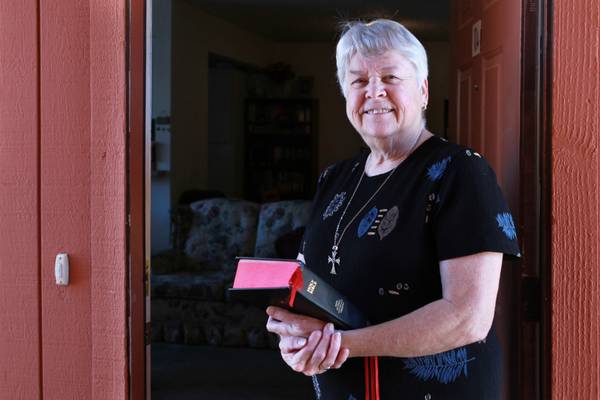More information
For help from the Rainbow Hotline, call 702-435-7842. For questions about volunteering or the Mary Magdalene Friends United Church of Christ, call 702-685-3859.
The bumper sticker on the Rev. Kathryn Obenour’s refrigerator says it simply and succinctly: “Love God Love People.”
Influenced strongly by her religious and family upbringing, Obenour has spent her 73 years doing that to the best of her ability. Now, recently unretired and running a small congregation in the northeast valley, Obenour has one last project.
Seeing a need for domestic violence services for Clark County’s lesbian, gay, bisexual and transgender community, Obenour and the Mary Magdalene Friends United Church of Christ launched a crisis hotline last year. They have their sights set on building a shelter for victims of abuse.
“The (existing shelters) will take anyone, but they don’t really have facilities for sheltering beyond women,” she said. “Even mature adolescent male children are a problem for them. Their focus is on providing services to heterosexual women. Which is wonderful … I’m delighted with the presence of all of them, but these other things are also needed.”
Obenour grew up in Ohio, where her mother offered rooms to women released from the local psychiatric hospital, helping them transition out of institutionalized life.
After working as an educator, Obenour went to seminary school and was ordained in the UCC, which has a history of inclusiveness. It was the first major Christian denomination to ordain a gay minister and to sanction same-sex marriages.
“Our strong belief is that however God created you, you are good,” Obenour said.
After seminary school, she spent the better part of two decades in Defiance, Ohio, where she spent eight years running a women’s health and family services organization with a domestic violence shelter.
In 2005, Obenour followed her adult son and his family to Las Vegas, and for a time she was content to spend time with her grandchildren and enjoy retirement. But she got the itch to lead a congregation again, and in March 2011 she founded Mary Magdalene Friends UCC.
Following her mother’s example, Obenour routinely offers space in her own home to people in need. As the congregation discussed the social mission of the new church, a transgender houseguest of Obenour’s mentioned the need for greater services for LGBT victims of domestic violence.
After obtaining background checks on volunteers, and undergoing training in crisis prevention and assistance, Obenour and the congregation launched Rainbow Hotline in 2013. It wasn't the first hotline focused on the LGBT community. Gender Justice Nevada runs the Queer Anti-Violence Project hotline, which takes calls involving all types of situations. But the Rainbow Hotline is the only one in the state to focus on domestic violence in the LGBT community.
“California is doing some things, but there aren’t many specific resources out there for LGBT victims of domestic abuse,” said Holly Reese, transgender and senior programming manager at The Center. “In terms of the hotline and building Rainbow House (the name of the proposed shelter), this is innovative for Vegas and this state.”
A 2010 study by the Centers for Disease Control and Prevention found that bisexual and lesbian women were more likely to experience domestic violence than heterosexual women, and bisexual men were more likely to experience sexual violence than heterosexual men and gay men, who have similar rates.
“Unfortunately, we believe domestic violence among the LGBT community is vastly underreported,” Reese said. “There are a lot of reasons that prevent people from reaching out for help in the way that other communities do. It is assumed for the most part that domestic violence is something that happens to women, and most of the shelters and organizations cater to this idea of women who are the victims and men who are perpetrators.”
According to a 2010 survey by the National Coalition of Anti-Violence Programs, 45 percent of LGBT domestic violence victims were turned away from a shelter, and roughly 55 percent were denied protection orders.
Progress, and some grant money, may be on the way. In 2013, when President Barack Obama signed a renewal of the 1994 Violence Against Women Act, which contains protections for victims of domestic violence and money for grants, language regarding same-sex abuse was added to the law.
Safe Nest and Safe House, the primary shelters for domestic violence in Clark County, primarily aid women and their children, said Safe Nest director of community relations Lisa Lynn Chapman. But they take everyone.
“We will provide everyone with the same services,” Chapman said. “There are people who will feel more comfortable knowing the person on the other side of the line is of the same orientation. We welcome everyone and will provide services for any victims regardless of their gender identity or orientation, including shelter and counseling.”
Jamie Sprague-Ballou, a transgender woman in Obenour’s congregation who is also studying to be a reverend, says the LGBT community, and transgender people specifically, have a hard time finding acceptance. As a result, they are reluctant to flee an abusive relationship, contact authorities or seek help.
“I know transgender women who’ve had nowhere to go and were turned away from shelters here in town.” Sprague-Ballou said. “It can be very hard to leave the abusive relationship.”
UCC has given Mary Magdalene Friends $20,000 toward the project, and the congregation continues to raise money bit by bit through activities such as selling commemorative bricks and holding an annual holiday fundraiser, "Gaze into the Holidays," this year on Dec. 13. They are also sponsoring a scholarship through an essay contest focused on raising awareness of domestic violence services.
Obenour is pacing herself, hoping the shelter is operating before she can no longer offer rooms in her own home.
“Pragmatically,” she said, “I’d like to see this shelter built before I die.”


Join the Discussion:
Check this out for a full explanation of our conversion to the LiveFyre commenting system and instructions on how to sign up for an account.
Full comments policy